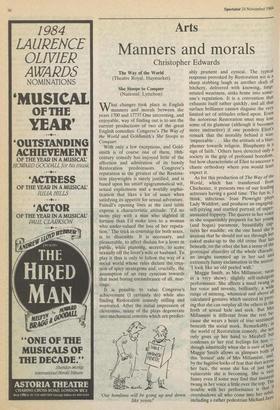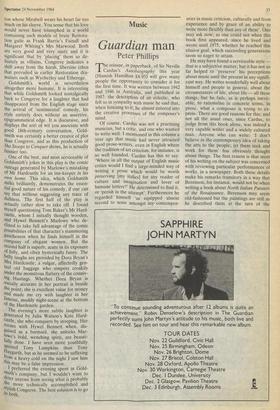Arts
Manners and morals
Christopher Edwards
The Way of the World (Theatre Royal, Haymarket) She Stoops to Conquer (National: Lyttelton)
What changes took place in English manners and morals between the years 1700 and 1773? One interesting, and enjoyable, way of finding out is to see the current productions of two of the great English comedies: Congreve's The Way of the World and Goldsmith's She Stoops to Conquer.
With only a few exceptions, and Gold- smith is of course one of them, 18th- century comedy has enjoyed little of the affection and admiration of its bawdy Restoration predecessors. Congreve's reputation as the greatest of the Restora- tion playwrights is surely justified, and is based upon his smart epigrammatical wit, sexual explicitness and a worldly sophis- tication that likes a lot of sauce when satisfying its appetite for sexual adventure. Fainall's opening lines at the card table express a characteristic attitude: 'I'd no more play with a man who slighted ill fortune than I'd make love to a woman who under-valued the loss of her reputa- tion.' The trick in courtship for both sexes, is to dissemble. It is necessary, and pleasurable, to affect disdain for a lover in public, while planning, secretly, to score sexually off the lover's wife or husband. To play it thus is only to follow the way of a social world whose rules dictate the crea- tion of spicy strategems and, crucially, the assumption of an easy cynicism towards that most boring encumbrance of all, mar- riage.
It is possible to value Congreve's achievement (I certainly do) while also finding Restoration comedy stifling and overrated. After the initial impression of cleverness, many of the plays degenerate into mechanical conceits which are predict- 'Our hemlines will be going up and down like yoyos!'
ably prurient and cynical. The typical response provoked by Restoration wit is a sharp stabbing laugh as another shaft of bitchery, delivered with knowing, limp- wristed weariness, sinks home into some- one's reputation. It is a convention that exhausts itself rather quickly, and all that surface brilliance cannot disguise the vet)' limited set of attitudes relied upon. Even the notorious Restoration smut may lose some of its glamour (although it becomes more instructive) if one ponders Eliot 's remark that the morality behind it was: 'impeccable . . . like the attitude of a blas- phemer towards religion. Blasphemy is a sign of faith.' Others have detected only a society in the grip of profound boredom, but how characteristic of Eliot to uncover a chaste orthodoxy where you would least expect it. As for this production of The Way of the World, which has transferred front Chichester, it presents two of our leading actresses having a good time. The fun is, I think, infectious. Joan Plowright plaYs Lady Wishfort, and produces an engaging, self-pitying and startled portrait of super' annuated frippery. The quaver in her voice as she coquettishly prepares for her young (and bogus) paramour, beautifully cap- tures her muddle; on the one hand she Is anxious that he should not see through her caked make-up to the old crone that lies beneath; on the other she has a sense of the grotesque absurdity of the whole charade, an insight summed up in her sad and extremely funny exclamation in the mirror. 'I look like an old peeled wall.' Maggie Smith, as Mrs Millament, turns in a very showy, slightly self-indulgent performance. She affects a nasal twang In her voice and invents, brilliantly, a wo:1,?, range of mincing, whimsical and above an calculated gestures which succeed in prov- ing that she can outplay all the others in the froth of sexual hide and seek. But Mrs Millament is different from the rest be" cause she wears a heart of true sentiment beneath the social mask. Remarkably, In the world of Restoration comedy, she rOt only gives up her hand to Mirabell hut confesses to her real feelings for him.' though admittedly when she is sure of hint; Maggie Smith allows us glimpses both 0' this 'honest' side of Mrs Millament, anti' by the fugitive looks of fear that dart across her face, the sense she has of just how vulnerable she is becoming. She is vel funny even if some may find that insister) twang in her voice a little over the top. Ti trouble with her performance is that .11 overshadows all who come into her orbit, including a rather pedestrian Michael Jays
ton whose Mirabell wears his heart far too much on his sleeve. You sense that his love would never have triumphed in a world containing such models of brute Restora- tion guile as Frank Barrie's Fainall and Margaret Whiting's Mrs Marwood. Both are very good and very nasty and it is Significant that by 'placing' them so de- finitely as villains, Congreve indicates a shift away from the harsh, libertine ethos that prevailed in earlier Restoration dra- matists such as Wycherley and Etherege.
Goldsmith's world is nevertheless altogether more humane. It is interesting that while Goldsmith looked nostalgically back to Congreve for a laughter that had disappeared from the English stage since the arrival of 'sentimental' comedy, his style entirely does without an assertive, epigrammatical edge. It is discursive, and displays the sort of wit you associate with good 18th-century conversation. Gold- smith was certainly a better creator of plot than Congreve, and as this production of She Stoops to Conquer shows, he is actually funnier too.
One of the best, and most serviceable of Goldsmith's jokes in this play is the comic outrage generated by Marlowe's mistaking of Mr Hardcastle for an inn-keeper in his Own home. This idea, which Goldsmith milks brilliantly, demonstrates the essen- tial good nature of his comedy, if one can say that without suggesting any trace of dullness. The first half of the play is actually rather slow to take off. I found Myself questioning Tom Baker's Mr Hard- castle, whom I initially thought wooden, and Hywel Bennett's Marlowe who de- clined to take full advantage of the comic Possibilities of that character's stammering gaucheness when he finds himself in the company of elegant women. But the second half is superb; acute in its exposure of folly, and often hysterically funny. The belly laughs are provided by Dora Bryan's Mrs Hardcastle; a vulgar, affectedly gen- teel old baggage who simpers croakily 9.nder the monstrous flattery of the conniv- ing Hastings. Whether Dora Bryan is socially accurate in her portrait is beside the point; she is excellent value for money and made me cry with laughter in her famous, muddy night-scene at the bottom of the Hardcastle garden. The evening's more subtle laughter is generated by Julia Watson's Kate Hard- Castle, she who conquers by stooping. Her scenes with Hywel Bennett when, dis- guised as a barmaid, she unlocks Mar- lowe's bold, wenching spirit, are beauti- 4Y done. I have seen more youthfully spirited Tony Lumpkins than Tony HaYgarth, but as he seemed to be suffering from a heavy cold on the night I saw him this may be a false impression. I preferred the evening spent in Gold- smith's company, but I wouldn't want to deter anyone from seeing what is probably the more technically accomplished and Stylish Congreve. The best solution is to go to both.























































 Previous page
Previous page